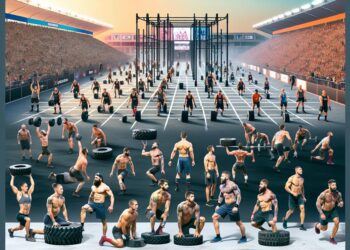Have you ever wondered if the protein powder you're using is actually helping your CrossFit performance? Let's clear up the confusion and debunk some common myths surrounding CrossFit and nutrition. From the role of carbs to the truth about fats and the timing of your meals, there are plenty of misconceptions that need to be addressed. By the end of this discussion, you'll have a better understanding of how to fuel your body for optimal performance in the box and beyond.
Key Takeaways
- Protein is vital for muscle repair and growth in CrossFit training.
- Opt for complex carbs for sustained energy during workouts.
- Healthy fats support overall health and should be included in the diet.
- Proper hydration is crucial for performance and recovery in CrossFit.
Protein Myths Unraveled
When it comes to protein myths, separating fact from fiction is crucial for understanding its role in your diet and fitness routine. Protein is an essential macronutrient made up of amino acids that your body needs for various functions, including building and repairing tissues. To debunk some common misconceptions, let's delve into protein sources and the digestion process.
Protein sources vary widely and include both animal and plant-based options. Animal sources such as meat, poultry, fish, and dairy products are considered complete proteins, meaning they provide all essential amino acids. On the other hand, plant-based sources like beans, lentils, nuts, and seeds can also be excellent protein sources when combined to ensure a full amino acid profile.
Understanding the digestion process of protein is key. It starts in the stomach, where enzymes break down the protein into smaller peptides. These peptides are then further broken down in the small intestine before being absorbed into the bloodstream. This process highlights the importance of consuming adequate protein to support muscle growth and recovery effectively.
Carb Confusion Clarified
Carbohydrates play a crucial role in providing your body with energy for daily activities and exercise. Understanding how carbs affect your body's energy levels and performance can help you make informed choices about your diet. Here are some key points to clarify any carb confusion:
- Glucose Utilization: Carbs are broken down into glucose, which is the primary source of energy for your body. Glucose is used by your muscles during exercise to fuel your workouts and improve performance.
- Insulin Response: When you consume carbs, your blood sugar levels rise, leading to an insulin release. Insulin helps transport glucose into your cells for energy production and storage, crucial for replenishing glycogen stores after a workout.
- Carb Timing: Consuming carbs before and after workouts can optimize glucose utilization and enhance performance. Pre-workout carbs provide immediate energy, while post-workout carbs aid in recovery and muscle glycogen replenishment.
- Quality Matters: Opt for complex carbs like whole grains, fruits, and vegetables over simple sugars for sustained energy levels and better overall health.
Understanding the role of carbohydrates in glucose utilization and insulin response can help you make informed choices to fuel your body effectively.
Fat: Friend or Foe?

To optimize your nutrition and fitness goals, understanding the role of fats in your diet is essential. Fats misconception often leads to the belief that all fats are harmful. In reality, fats play a crucial role in your body, serving as a source of energy, aiding in nutrient absorption, and supporting cell growth. The key lies in choosing the right types of fats and consuming them in moderation to maintain a healthy nutritional balance.
Not all fats are created equal. Healthy fats, such as those found in avocados, nuts, seeds, and fish, can actually benefit your overall health. These fats, known as unsaturated fats, can help reduce inflammation, improve cholesterol levels, and support brain function. On the other hand, saturated fats and trans fats, often found in processed and fried foods, should be limited as they can increase the risk of heart disease and other health issues.
Incorporating a variety of healthy fats into your diet while being mindful of portion sizes can help you achieve a well-rounded nutritional balance and support your fitness endeavors.
Timing and Supplements Truth
Understanding the importance of timing and choosing the right supplements can significantly enhance your fitness journey and overall well-being. When it comes to optimizing your performance and recovery, paying attention to pre-workout fueling and post-exercise recovery is key. Here are some essential points to consider:
- Pre-Workout Fueling: Fueling your body adequately before a workout can improve energy levels and performance. Aim for a balanced meal or snack that includes carbohydrates for energy and protein for muscle support.
- Post-Exercise Recovery: After a workout, your body needs nutrients to repair and refuel. Consuming a combination of protein and carbohydrates within 30-60 minutes post-exercise can enhance recovery.
- Supplement Selection: While some supplements can support your fitness goals, it's essential to choose wisely. Consult with a healthcare provider or nutritionist to determine which supplements, if any, are right for you.
- Timing Matters: Timing your meals and supplements around your workouts can maximize their benefits. Experiment with different timing strategies to find what works best for your body.
Hydration Hype Demystified

Navigating the world of hydration can be overwhelming, but understanding the facts will help you separate myths from truths. Proper hydration is essential for overall health and athletic performance. Water intake varies depending on factors like activity level, climate, and individual differences. For most people, aiming for about 8-10 cups (64-80 ounces) of water per day is a good starting point. However, some may need more, especially if they are very active or live in hot climates.
Electrolytes play a crucial role in hydration. These minerals, such as sodium, potassium, and magnesium, help regulate fluid balance in the body. During intense exercise or in hot weather, electrolytes are lost through sweat and need to be replenished. Sports drinks or electrolyte tablets can be beneficial in these situations, but for most daily hydration needs, plain water is sufficient.
Frequently Asked Questions
What Are the Best Pre-Workout Snacks to Fuel a Crossfit Workout?
For a successful CrossFit session, opt for energy-boosting pre-workout snacks. Timing matters, so consume a mix of carbs and protein about 30-60 minutes before. Try a banana with nut butter or Greek yogurt with fruit.
Can You Still Build Muscle and Lose Fat on a Vegan or Vegetarian Diet?
Yes, you can still effectively build muscle and lose fat on a vegan or vegetarian diet. Plant-based protein sources like lentils, tofu, and quinoa provide essential nutrients. Nutrient absorption in vegans can be optimized by combining foods rich in iron with vitamin C.
Is Intermittent Fasting a Good Option for Crossfit Athletes Looking to Improve Performance?
If you're looking to enhance performance in CrossFit, intermittent fasting might be worth exploring. Proper meal timing can impact your performance, while staying hydrated is crucial for recovery. Experiment cautiously to see what works best for you.
How Important Is It to Track Macros (Protein, Carbs, Fats) for Optimal Performance in Crossfit?
You might think tracking macros is tedious, but it's crucial for peak CrossFit performance. By monitoring protein, carbs, and fats, you optimize nutrition for energy and muscle support. Macro tracking is highly effective in enhancing performance.
Are There Any Specific Vitamins or Minerals That Crossfit Athletes Should Prioritize in Their Diet for Improved Recovery and Performance?
To enhance recovery and performance in CrossFit, prioritize vitamins and minerals like magnesium, potassium, and vitamin D. Hydration strategies and maintaining electrolyte balance are crucial. Post-workout meals with the right nutrients at the right time can optimize results.
Conclusion
In conclusion, debunking myths about CrossFit and nutrition is crucial for achieving optimal performance and results. Did you know that a study published in the Journal of Strength and Conditioning Research found that athletes who consumed adequate protein experienced greater muscle growth and recovery? By understanding the truth behind common misconceptions, you can make informed choices to fuel your body effectively and reach your fitness goals. Stay informed and challenge the myths to see real progress in your fitness journey.













